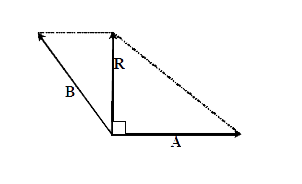The vector sum of two forces is perpendicular to their vector differences. In that case, the forces
Are equal to each other in magnitude
Are not equal to eachh other in magnitude
Cannot be predicted
Are equal to eachh other
The correct Answer is:A
Step by step video, text & image solution for The vector sum of two forces is perpendicular to their vector differences. In that case, the forces by Physics experts to help you in doubts & scoring excellent marks in Class 11 exams.
Topper's Solved these Questions
Similar Questions
Knowledge Check
- Question 1 - Select One
The vector sum of two forces is perpendicular to their vector differences. In that cases, the forces
Aare not equal to each other In magnitudeBare parallelCare perpendicularDare equal to each other In magnitude - Question 2 - Select One
The sum of two vectors A and B is at right angles to their difference. Then
AA=BBA=2BCB=2ADA and B have the same direction - Question 3 - Select One
Two forces are such that the sum of their magnitudes is 18N and their resultant is 12 N which is perpendicular to the smaller force. Then the magnitude of the forces are
A(a) 12N, 6NB(b) 13N, 5NC(c) 10N, 8ND(d) 16N, 2N
Vector sum of two forces of 10N and 6N cannot be:
View SolutionThe resultant of two vectors A and B is perpendicular to the vector A and its magnitude is equal to half the magnitude of vector B. The angle between A and B is -
 View Solution
View SolutionIf the magnitude of sum of two vectors is equal to the magnitude of difference of the two vectors, the angle between these vectors is
View SolutionIf the magnitude of sum of two vectors is equal to the magnitude of difference of the two vector, the angle between these Vector is
View SolutionIf the magnitude of sum of two vectors is equal to the magnitude of difference of the two vectors, the angle between these vectors is
View Solution

